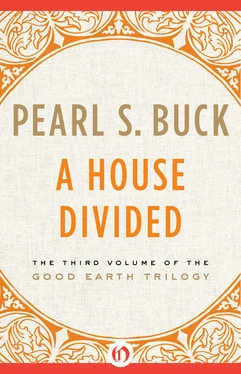There remained therefore only his work, and into this he would have poured his strength, but even here the year did him evil. For the discontent of the times spread among the schools, and the students quarreled with the laws laid down for them, and they felt too much the rights their youth gave them, and they quarreled with their rulers and their teachers and refused to work and stayed out of school, so that often when Yuan went to his windy classroom, it was empty and there was no one for him to teach and he must go home again and sit and read his old books he knew before, for he dared not spend money for new ones, since steadfastly he sent half of all he earned to his uncle for his debt. In these long dark nights the end of that debt seemed as hopeless to him as the dream he once had had of Mei-ling.
One day in despair at his own idleness, for seven days on end he had gone only to find his schoolroom empty, he walked through mud and drifting rain out to the land where he had planted the foreign wheat that day. But even here there was to be no harvest, for whether the foreign wheat was not used to such long rains, or whether the black and heavy clay held the water beyond what the roots could bear, or what the wrong was, the foreign wheat lay rotting on the mucky earth. It had sprung up quick and tall and every seed had been alive and swift and eager to put forth. But the earth and skies were not native to it, and it took no deep natural root, and so it lay spoiled and rotted.
Even while Yuan stood and looked sorrowfully at this hope gone, too, a farmer saw him, and ran out in all the rain to cry out with malice and pleasure, “You see the foreign wheat is not good, after all! It sprang up very tall and fair, but it has no staying strength! I said at the time, it is not in nature to have such large pale seeds — look at my wheat — too wet, to be sure, but it will not die!”
In silence Yuan looked. It was true enough; in the next field the small strong wheat stood sturdily even in all the mud, scanty and short, but not dead. … He could not answer. He could not bear the man’s common face and pleased stupid laughter. For one swift moment he saw why Meng struck the ricksha puller. But Yuan could never strike. He only turned in silence and went his own way again.
Now what would have been the end of Yuan’s despair in this dull spring he did not know. That night he lay and sobbed on his bed he was so melancholy, although he wept for no one single cause. It seemed to him as he sobbed that he grieved because the times were so hopeless, the poor still poor, the new city unfinished and drab and dreary in the rains, the wheat rotted, the revolution weakened and new wars threatening, his work delayed by the strife of the students. There was nothing not awry to Yuan that night, but deepest awry of all was this, that for forty days there was no letter from Mei-ling and her last words still were as clear in his mind as the moment she spoke them, and he had not seen her again after she had cried, “Oh, I hate you!”
Once the lady wrote him, it is true, and Yuan seized the letter eagerly to see if perhaps Mei-ling’s name was there, but it was not. The lady spoke only now of Ai-lan’s little son, and how rejoiced she was because though Ai-lan was gone home again to her husband, she left the child with her mother to be cared for, since she felt the child too much trouble for her, and the lady said gratefully, “I am weak enough almost to be glad Ai-lan so loves her freedom and her pleasures, for it leaves this child to me. I know it is wrong in her. … But I sit and hold him all day long.”
Now thinking of this letter as he lay in his dark and lonely room it added one more small sadness to him. The new little son seemed to have taken all the lady’s heart so even she needed Yuan no more. In a great rush of pity for himself he thought, “I am not needed anywhere, it seems!” And so he wept himself at last to sleep.
Soon the discontents of these times were everywhere very widespread, and much more widely spread than Yuan could know, bound as he was by his solitary life in the new city. It was true he wrote dutifully once in every month to his father, and every other month the Tiger answered his son’s letter. But Yuan had not been home again to visit him, partly because he wished to be steadfast to his work, the more because there were not many steadfast in these changing times, and partly because in the little holiday he had he longed most to see Mei-ling.
Nor could he have perceived clearly how the times were from the Tiger’s letters, for the old man wrote only the same thing again and again without knowing he did, and always he wrote bravely of how in the spring he planned a great attack against the robber chieftain in those parts, for that robber was growing too bold by half, but he, the Tiger, vowed he would put him down yet with his loyal men, and for the sake of all good people.
Such words Yuan read scarcely heeding them any more. It did not make him angry now to hear his old father boast, and if he answered anything it was only to smile somewhat sadly because such boasting had once a power to frighten him, and now he knew it was only poor empty words. Sometimes he thought to himself, “My father grows old indeed. I must go to him in the summer and see how he does.” And once he thought moodily, “I might as well have gone this holiday for all the good it did me.” And he sighed and fell to reckoning how much of his debt could be paid by the summer, at the rate he could pay it, and hoping his wage would not be delayed or held back as it now was often in these troubled times which were not wholly old or wholly new and full of many uncertainties.
So there was nothing in the Tiger’s letters to prepare his son for what befell him.
One day when Yuan had only just risen from his bed and stood half washed beside his little stove, where every morning he laid his own fire and lighted it for warmth against the cold wet air, there was at his door a knock, timorous and yet persistent. He cried out, “Enter!” and there entered the last man he would have said could stand there, and it was his country cousin, the eldest son of his uncle, Wang the Merchant.
Yuan could see at once that some evil had befallen this little careworn man, for there were black bruises on his skinny yellow throat, and deep bloody scratches on his small withered face, and he had a finger gone from his right hand, and a foul rag dark with blood was red about the stub.
All these violent marks Yuan saw, and he stood speechless, not knowing what to say or think, he was so surprised. This little man, when he saw Yuan, began to sob but he held his sobs noiseless under his breath and Yuan saw he had some terrible tale to tell. He drew his garments quickly about him, therefore, and he made his cousin sit down, and he fetched some tea leaves in a pot, and poured water from the boiling kettle in the little stove and then he said, “Speak when you can and tell me what has happened. I can see it is some very fearful thing.” And he waited.
Then the man caught his breath and he began, but in a low small voice, looking often at the closed door to see it did not move, and he said, “Nine days ago and one night the robber bands came against our town. It was your father’s fault. He came to spend a while at my father’s house and wait for the old moon year to pass and he would not be still as an old man ought to be. Time and again we besought him to be silent, but he would boast everywhere how he planned to go out to war against this robber chieftain as soon as spring was come and how he would down him as he had before. And we have enemies enough upon the land, for tenants hate their landlords always, and be sure those somehow told the robbers to incite them. At last the chieftain grew angry and he sent men out to cry everywhere in scorn that he feared no old toothless Tiger, and he would not wait for spring, but he would begin war now against the Tiger and all his house. … Even so, my cousin, we might have stayed him, for hearing this, my father and I, we made haste to send him a great sum of money and twenty head of oxen and fifty head of sheep for his men to kill and eat, and we made amends for your father’s insult, and besought the chieftain not to heed an old man’s talk. So I say it might have passed except for a trouble in our own town.”
Читать дальше












